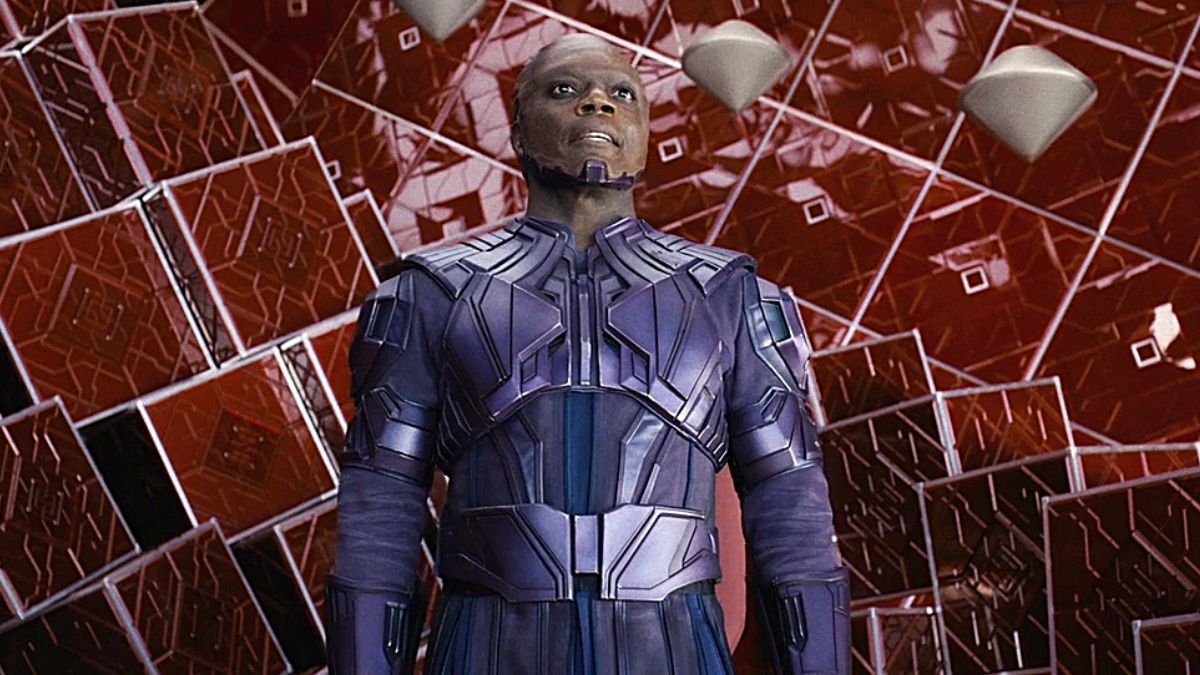Chukwudi Iwuji’s High Evolutionary has been the talk of the town ever since Guardians of the Galaxy Vol. 3 hit theaters in the first week of May. The perverted, obsessed villain with a God complex had everyone grinding their teeth and clenching their fists in those theater chairs, hoping they could jump into the screen and help the Guardians take him down and bring Rocket and his friends the justice they deserved.
Online, Twitter abounded with comparisons to Ant-Man and The Wasp: Quantumania‘s Kang The Conqueror — who is supposed to become the Thanos of post-Endgame Marvel. But a lot of the comments were also about how great it is that there isn’t a single redeemable trait in the High Evolutionary; he’s an unambiguously evil villain you never feel sympathy for.
Once upon a time, the Marvel Cinematic Universe was accused of falling short when it came to its villains during the early phases of the franchise. Films like Iron Man 1, 2, and 3, as well as Thor 1 and 2, featured cardboard forgetful detached villains, that weren’t really causing anyone to shake in their boots. Marvel found two ways around this. One was to create a villain in Thanos that would crossover between several films, with a master plan involving several moving parts, such as Loki’s invasion in the first Avengers and Ronan’s mission in the first Guardians. This would lead to bigger stakes and higher anticipation.
The other was to craft antagonists with an emotional drive behind their actions that would make audiences connect with and understand them, as they hoped for eventual redemption arcs. Villains like Loki, The Winter Soldier, Killmonger, Nebula, the Maximoff Twins, Namor, Zemo, and Xu Wenwu— all characters we all wish could stay a little while longer (and some have, thankfully) so we can see their growth.
However, following the reception of Guardians 3, it sounds like the MCU faithfuls were craving a purely evil villain they could all unite against, and that there might be some rising pushback against the type of sympathetic foes Marvel has come to perfect. As much as the High Evolutionary is certainly just straight odious scum, elevated by a fantastic performance from Iwuji, what many are failing to realize is that Guardians‘ writer/director James Gunn is himself the number one fan of redeemable villains turned anti-heroes.
Not only are the Guardians of the Galaxy a team made up of morally ambiguous anti-heroes, who steal, kill, and can often be self-serving, but so is the other squad of baddies Gunn breathed new life into in his first film for Marvel’s biggest competitor — 2021’s The Suicide Squad. As a result, Gunn’s superhero movies can’t really have the emotionally stunted villains acting off of their childhood traumas, because he’s made them his heroes.
Those who have grown tired of Marvel’s tendency to make you care for the bad guy, and were craving the pure detestable wickedness of the High Evolutionary forgot they were watching a movie made out of the franchise’s best anti-heroes. Who, in fact, are the first to welcome any person who shows even the slightest hint of regret or remorse — like Nebula and Adam Warlock — into their handcrafted dysfunctional home.
Guardians of the Galaxy Vol. 3 doesn’t prove that categorially bad enemies are better for your film, it just shows that rogues turned heroes make for such good characters that you’ll want to make a whole trilogy about them.

